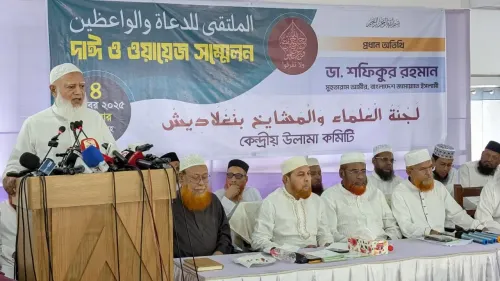Punjab, Pakistan Honors Baisakhi as Sikh Pilgrims Celebrate Khalsa's Birth

Synopsis
Key Takeaways
- Baisakhi signifies the start of the wheat harvest in Punjab.
- Traditional celebrations have been affected by mechanization.
- Baisakhi holds special religious significance for Sikhs.
- Major gatherings occur at Gurdwara Janam Asthan and Panja Sahib.
- The Punjab government implemented extensive security measures for pilgrims.
Lahore, April 13 (NationPress) The traditional agricultural festival of Baisakhi, which marks the commencement of the wheat harvest, was observed in Pakistan's Punjab on Sunday. However, the celebrations were somewhat subdued due to evolving farming practices, according to reports.
Annually celebrated on April 13, and occasionally on April 14, this festival remains deeply ingrained in the cultural heritage of rural Punjab, spanning both the India-Pakistan border.
For farmers, Baisakhi symbolizes the conclusion of months spent tending to their crops and the joyful onset of the harvesting season, a day when diligent effort finally reaps its rewards, as reported by The News.
Before the Partition, Baisakhi was a lively festival rich in folk traditions, with farmers coming together to the sounds of dholak beats, initiating the harvest with men performing bhangra in the fields while women sang tapay and mahiye.
Today, mechanization has transformed these customs, as combine harvesters and threshers have taken the place of community harvesting, leading to a loss of the festival's vibrancy, the report added.
Baisakhi also carries significant religious meaning for the Sikh community, as it commemorates the establishment of the Khalsa by Guru Gobind Singh in 1699.
Since the Partition, the festival has become more closely tied to Sikhism, now celebrated with a special ceremony at Gurdwara Panja Sahib in Hasan Abdal, located in Khyber-Pakhtunkhwa.
This year, however, the principal celebration is set to take place at Gurdwara Janam Asthan in Nankana Sahib, the birthplace of Guru Nanak.
In anticipation of Baisakhi, the district administration of Nankana Sahib has declared school holidays, closing all educational institutions from April 12 to April 16, as thousands of Sikh pilgrims began arriving from India to participate in the festivities, as reported by ARY News.
Officials stated that the closures aim to facilitate smooth arrangements and ensure tight security during the event.
The main Baisakhi celebration is planned for April 14, with preparations already in progress.
As part of security protocols, over 2,000 police officers and personnel will be deployed, and the District Police Officer has issued a comprehensive security plan for the occasion.
Sikh pilgrims started arriving in Pakistan last week to attend the 326th Baisakhi Mela, which began on April 10 and will run until April 19.
The mela is expected to host 20,000 local pilgrims, 3,000 from the diaspora, and 7,000 pilgrims from India and other nations.
The Punjab Home Department has implemented extensive security measures to ensure the safety of thousands of Sikh pilgrims arriving from around the globe for the Baisakhi Festival.
Prior to the celebrations, the Pakistani High Commission in New Delhi issued over 6,500 visas to Indian pilgrims, as stated by Charge d’Affaires Saad Ahmad Warraich.
Indian pilgrims are visiting several revered gurdwaras throughout Pakistan, including Gurdwara Panja Sahib, Gurdwara Kartarpur Sahib, and Gurdwara Nankana Sahib.
These visits are facilitated under the Pakistan-India Protocol on Visits to Religious Shrines established in 1974, which permits cross-border travel for religious purposes.









